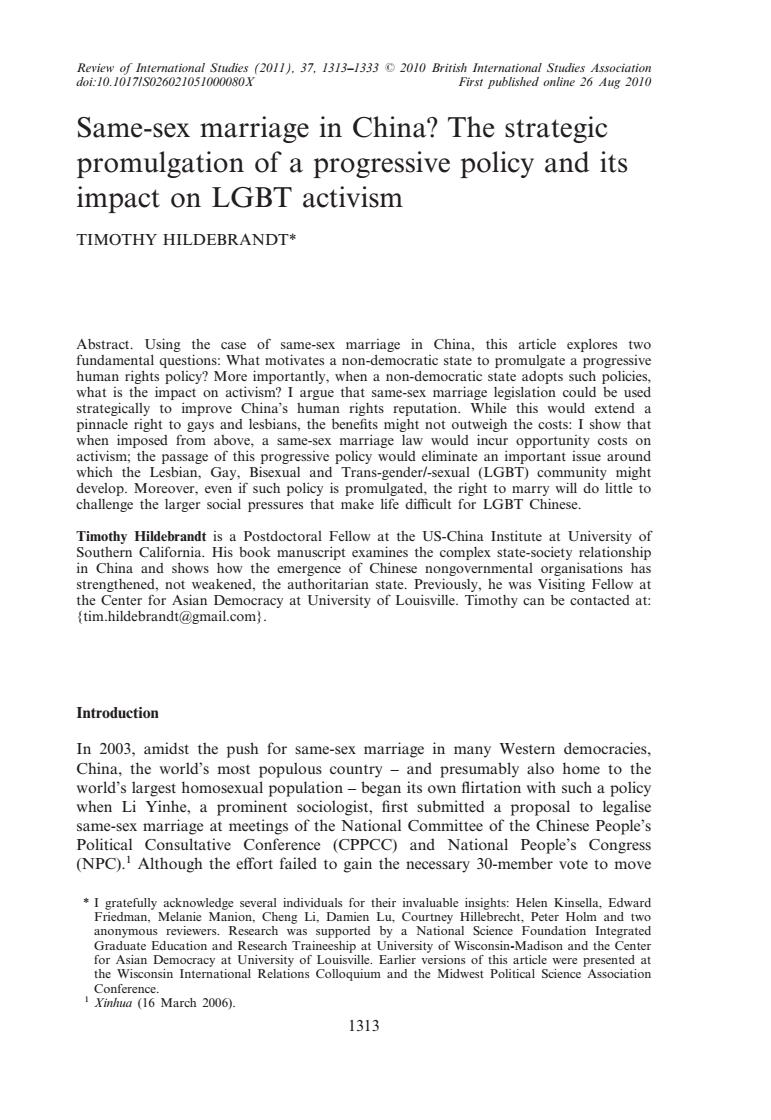正在加载图片...

Review of International Studies (2011).37.1313-1333 2010 British International Studies Association do元10.10171S026021051000080X First published online 26 Aug 2010 Same-sex marriage in China?The strategic promulgation of a progressive policy and its impact on LGBT activism TIMOTHY HILDEBRANDT* Abstract.Using the case of same-sex marriage in China,this article explores two fundamental questions:What motivates a non-democratic state to promulgate a progressive human rights policy?More importantly,when a non-democratic state adopts such policies, what is the impact on activism?I argue that same-sex marriage legislation could be used strategically to improve China's human rights reputation.While this would extend a pinnacle right to gays and lesbians,the benefits might not outweigh the costs:I show that when imposed from above,a same-sex marriage law would incur opportunity costs on activism;the passage of this progressive policy would eliminate an important issue around which the Lesbian,Gay,Bisexual and Trans-gender/-sexual (LGBT)community might develop.Moreover,even if such policy is promulgated,the right to marry will do little to challenge the larger social pressures that make life difficult for LGBT Chinese. Timothy Hildebrandt is a Postdoctoral Fellow at the US-China Institute at University of Southern California.His book manuscript examines the complex state-society relationship in China and shows how the emergence of Chinese nongovernmental organisations has strengthened,not weakened,the authoritarian state.Previously,he was Visiting Fellow at the Center for Asian Democracy at University of Louisville.Timothy can be contacted at: tim.hildebrandt@gmail.com. Introduction In 2003,amidst the push for same-sex marriage in many Western democracies, China,the world's most populous country -and presumably also home to the world's largest homosexual population-began its own flirtation with such a policy when Li Yinhe,a prominent sociologist,first submitted a proposal to legalise same-sex marriage at meetings of the National Committee of the Chinese People's Political Consultative Conference (CPPCC)and National People's Congress (NPC).Although the effort failed to gain the necessary 30-member vote to move I gratefully acknowledge several individuals for their invaluable insights:Helen Kinsella.Edward Friedman,Melanie Manion,Cheng Li,Damien Lu,Courtney Hillebrecht,Peter Holm and two anonymous reviewers.Research was supported by a National Science Foundation Integrated Graduate Education and Research Traineeship at University of Wisconsin-Madison and the Center for Asian Democracy at University of Louisville.Earlier versions of this article were presented at the Wisconsin International Relations Colloquium and the Midwest Political Science Association Conference. Xinhua (16 March 2006). 1313Same-sex marriage in China? The strategic promulgation of a progressive policy and its impact on LGBT activism TIMOTHY HILDEBRANDT* Abstract. Using the case of same-sex marriage in China, this article explores two fundamental questions: What motivates a non-democratic state to promulgate a progressive human rights policy? More importantly, when a non-democratic state adopts such policies, what is the impact on activism? I argue that same-sex marriage legislation could be used strategically to improve China’s human rights reputation. While this would extend a pinnacle right to gays and lesbians, the benefits might not outweigh the costs: I show that when imposed from above, a same-sex marriage law would incur opportunity costs on activism; the passage of this progressive policy would eliminate an important issue around which the Lesbian, Gay, Bisexual and Trans-gender/-sexual (LGBT) community might develop. Moreover, even if such policy is promulgated, the right to marry will do little to challenge the larger social pressures that make life difficult for LGBT Chinese. Timothy Hildebrandt is a Postdoctoral Fellow at the US-China Institute at University of Southern California. His book manuscript examines the complex state-society relationship in China and shows how the emergence of Chinese nongovernmental organisations has strengthened, not weakened, the authoritarian state. Previously, he was Visiting Fellow at the Center for Asian Democracy at University of Louisville. Timothy can be contacted at: {tim.hildebrandt@gmail.com}. Introduction In 2003, amidst the push for same-sex marriage in many Western democracies, China, the world’s most populous country – and presumably also home to the world’s largest homosexual population – began its own flirtation with such a policy when Li Yinhe, a prominent sociologist, first submitted a proposal to legalise same-sex marriage at meetings of the National Committee of the Chinese People’s Political Consultative Conference (CPPCC) and National People’s Congress (NPC).1 Although the effort failed to gain the necessary 30-member vote to move * I gratefully acknowledge several individuals for their invaluable insights: Helen Kinsella, Edward Friedman, Melanie Manion, Cheng Li, Damien Lu, Courtney Hillebrecht, Peter Holm and two anonymous reviewers. Research was supported by a National Science Foundation Integrated Graduate Education and Research Traineeship at University of Wisconsin-Madison and the Center for Asian Democracy at University of Louisville. Earlier versions of this article were presented at the Wisconsin International Relations Colloquium and the Midwest Political Science Association Conference. 1 Xinhua (16 March 2006). Review of International Studies (2011), 37, 1313–1333 2010 British International Studies Association doi:10.1017/S026021051000080X First published online 26 Aug 2010 1313